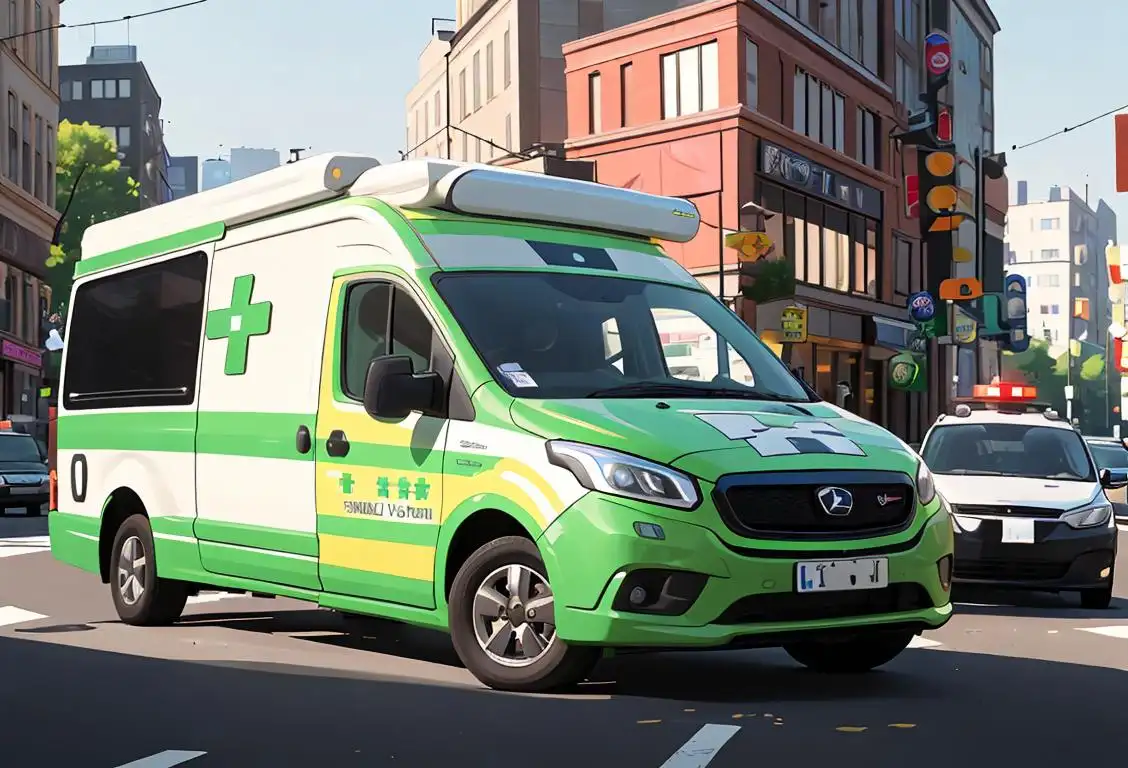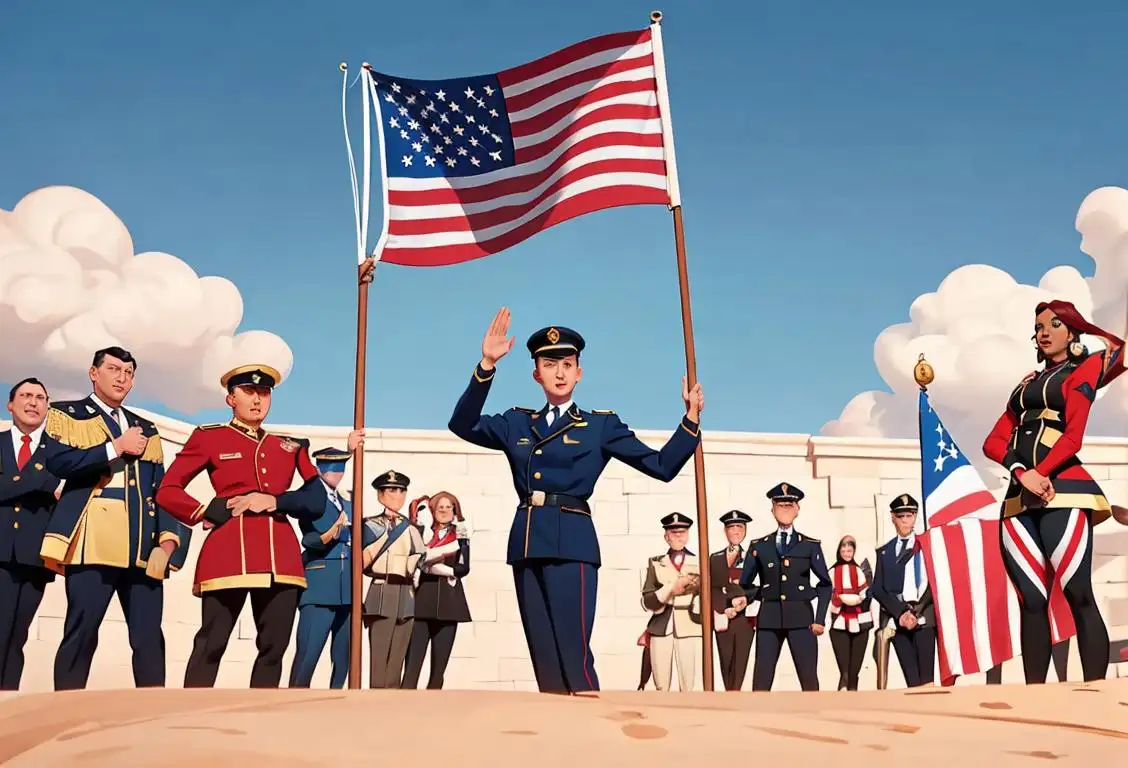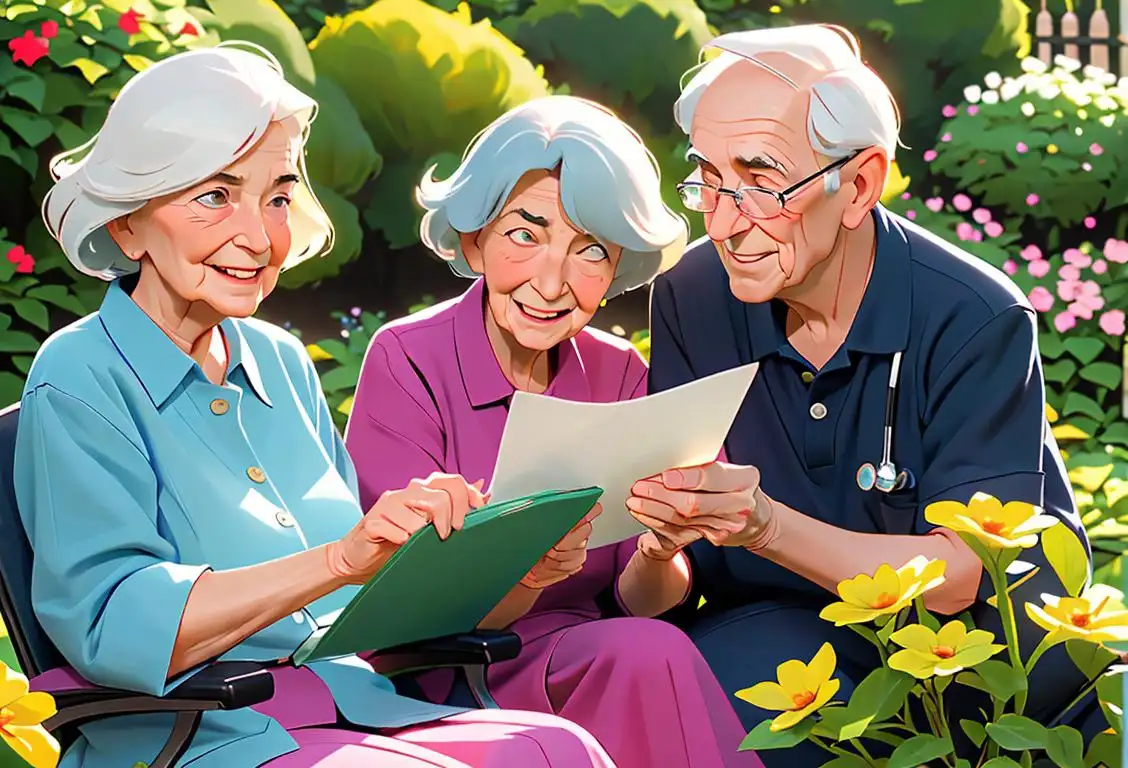National Bloodbikes Awareness Day

Hey there, fellow internet explorer! Today, I have a gripping article for you about National Bloodbikes Awareness Day. It's a day filled with heroes on two wheels, and it's time to rev up your curiosity! So buckle up (or should I say buckle on your helmet?) and let's dive into the fascinating world of bloodbikes!
When is Bloodbikes Awareness Day?
It's national bloodbikes awareness day on the 14th August.
What's the Scoop on National Bloodbikes Awareness Day?
If you're like me, your first thought may be: what on earth are bloodbikes? Well, my friend, allow me to enlighten you. National Bloodbikes Awareness Day is a special occasion dedicated to raising awareness about the incredible bloodbike volunteers who deliver essential medical supplies and equipment to hospitals and healthcare facilities.
These unsung heroes, clad in their distinctive bright yellow or green fluorescent jackets, zoom around the streets on their motorbikes, maneuvering through traffic with the precision and agility of a hummingbird. They provide a crucial lifeline for patients in need by transporting blood, organs, and other urgently needed items, often outside normal working hours.
Not only do these bloodbikes save lives, but they also save valuable time and resources for our beloved healthcare system. By zipping through congested city streets, they can bypass the never-ending gridlock and ensure that medical supplies reach their destination swiftly. It's a true adrenaline-fueled operation that deserves all the applause and recognition it can get.
How Did National Bloodbikes Awareness Day Start?
Now, let's hop on our virtual time machine and zoom back to the origins of this remarkable day. The first recorded celebration of National Bloodbikes Awareness Day took place on August 14, 2020. With a total of 24 online mentions, this date saw a surge of recognition for the selfless bloodbike riders and their contributions to the healthcare industry.
Though the exact internet history that led to the establishment of this day remains a mystery, one can imagine that it started with a grassroots movement of individuals passionate about shedding light on the noble work of these riders. With the power of social media and the internet, the news spread like wildfire, and soon enough, National Bloodbikes Awareness Day became an annual event that continues to inspire and unite people worldwide.
Did You Know?
Now, for a little extra fun! Did you know that the first bloodbike groups in the United Kingdom emerged as a response to the country's transport restrictions during fuel shortages in the 1960s and 1970s? These resourceful individuals decided to put their motorcycles to good use by delivering urgently needed medical supplies, ultimately laying the groundwork for the modern bloodbike movement we celebrate today!
History behind the term 'Bloodbikes Awareness'
1977
The Rise of Blood Donor Motorcycles
In 1977, the idea of using motorcycles to transport blood and other medical supplies received attention in the United Kingdom. Blood bikers, as they came to be known, offered their services as volunteer riders to deliver essential items swiftly and efficiently to hospitals and medical centers. These riders were often found using their own motorcycles to support the cause.
1962
Motorcycle courier services introduced
In 1962, motorcycle courier services were introduced in the United Kingdom as a means to deliver urgent packages and medical supplies quickly. These services became popular due to their ability to navigate through traffic more efficiently than traditional delivery vehicles.
1962
The birth of the motorcycle courier service
In 1962, the concept of the motorcycle courier service was first introduced, providing a fast and efficient method of transporting parcels and documents in urban areas. This service allowed for quick delivery times and reduced congestion on the roads.
1962
The birth of bloodbikes
In 1962, the concept of bloodbikes was born in the United Kingdom. It started with a group of compassionate volunteers who saw the need for a fast and efficient way to transport blood and other medical supplies between hospitals. These dedicated individuals began using their own motorcycles to provide this vital service, saving precious time and potentially saving lives.
1962
The Founding of the Freewheelers
In 1962, the Freewheelers volunteer group was established in the United Kingdom. They provided an out-of-hours courier service for hospitals, delivering urgently needed medical supplies, including blood and plasma, between healthcare facilities. This was the start of the bloodbikes movement, although the term 'bloodbikes awareness' had not yet come into existence.
2010
The Inception of Bloodbikes
In 2010, the concept of bloodbikes was born in the United Kingdom. Bloodbikes, also known as volunteer motorcycle couriers, are individuals who transport medical items, such as blood, samples, and organs between hospitals, clinics, and laboratories. These dedicated riders play a crucial role in improving emergency healthcare provision by speeding up the delivery of life-saving supplies.
1962
The birth of the bloodbike service
In 1962, the first bloodbike service was established in the United Kingdom. These volunteer-run services provided free transportation of blood and other medical supplies between hospitals at a time when the National Health Service (NHS) had limited resources for such urgent deliveries.
2010
Establishment of Blood Bikes
In 2010, Blood Bikes were established as a volunteer-led charity in the United Kingdom. These dedicated individuals provided an out-of-hours motorcycle courier service to transport urgent medical supplies, such as blood, plasma, and breast milk, between hospitals.
1948
Start of the National Health Service (NHS)
The National Health Service (NHS) was founded in the United Kingdom in 1948, with the aim of providing free healthcare to all British citizens. This marked a significant turning point in the country's history, as access to healthcare became more widely available.
1962
Introduction of Blood Transfusion Services
In 1962, Blood Transfusion Services were established as part of the NHS. These services played a crucial role in collecting and distributing blood supplies to hospitals for emergency transfusions and other medical procedures.
2014
Raising Public Awareness
In 2014, the term 'Bloodbikes Awareness' began gaining traction. Various initiatives were undertaken to raise public awareness about the invaluable service provided by bloodbike volunteers. Social media campaigns, local events, and charity rides aimed to highlight the importance of bloodbike services and encourage more individuals to volunteer their time and motorcycles for this noble cause.
2008
Raising awareness through social media
With the rise of social media platforms such as Facebook and Twitter, the bloodbike services started gaining recognition beyond their immediate communities. Volunteers and supporters began sharing stories and photos of their valuable work, raising awareness about the importance of the bloodbike service in the healthcare system.
1973
The emergence of voluntary motorcycle blood couriers
In 1973, a breakthrough occurred when motorcycle couriers began volunteering their services to deliver blood and biological samples to hospitals and medical facilities. These selfless individuals recognized the urgent need for timely transportation of these lifesaving materials, particularly in emergency situations where every minute counts.
1975
MAC's Project starts
In 1975, the Motorcycle Action Group's (MAG) Medical Aid for Contractors (MAC) Project was established. This initiative aimed to provide volunteer motorcyclists who would transport urgently needed medical items, such as blood samples and medicines, between hospitals and laboratories.
2008
The Birth of Bloodbike Organizations
As the concept of blood bikers gained popularity, several regional groups were formed across the UK to support their efforts. One example is the Blood Bikes charity in the UK, which was established in 2008. These organizations aimed to provide a structured framework for volunteer riders and ensure a reliable and coordinated system for medical transport.
1991
Introduction of the Term 'Bloodbikes'
In 1991, the term 'bloodbikes' was coined by the founder of the Freewheelers, Margaret Ryerson, as a way to describe the critical role played by motorcycles in transporting blood and other essential medical items. This term gained popularity within the Freewheelers community and began to be used more widely in conversations about the important work being done by these volunteer riders.
2013
Raising Awareness and Recognition
By 2013, the term 'Bloodbikes' started gaining recognition within the healthcare community, as these remarkable volunteers continued to deliver crucial supplies across the country. The term 'Bloodbikes' emerged as an informal term to describe these motorcycle couriers, symbolizing their mission of saving lives through the quick and efficient delivery of essential medical provisions.
1972
Formalization of bloodbike groups
By 1972, the idea of using motorcycles for medical deliveries had gained traction. The first official bloodbike group, the Freewheelers Emergency Volunteer Service (EVS), was established in the UK. This marked a significant step towards professionalizing the service and ensuring its sustainability.
1991
Recognition and expansion
In 1991, bloodbike groups started receiving official recognition from the National Health Service (NHS) in the UK. This recognition highlighted the valuable contribution these volunteers were making to the healthcare system. With the increased support and acknowledgment, the bloodbike movement began to expand rapidly, with more groups forming across the country.
2009
Growing Public Awareness
Around 2009, the general public started to become more aware of the bloodbikes movement. This was partly due to increased media coverage and the efforts of organizations like the Freewheelers to raise awareness about their services. People began to recognize the distinctive liveried motorcycles zipping through traffic, delivering life-saving supplies to hospitals. 'Bloodbikes awareness' became a term used to describe the growing recognition and support for these volunteer-led initiatives.
2016
National Bloodbike Awareness Day
In 2016, the first National Bloodbike Awareness Day was established. This day, celebrated annually on a designated date, serves to honor the dedication and selflessness of bloodbike volunteers. It provides an opportunity to recognize their contributions and promote their cause further. National Bloodbike Awareness Day is marked by various activities, including fundraising events, open days at bloodbike organizations, and educational campaigns.
1971
Creation of the Emergency Fleet
In 1971, as a response to the increasing demand for urgent blood deliveries, the NHS established the Emergency Fleet. This fleet consisted of specially trained motorcycle riders who were responsible for transporting blood and other medical supplies quickly and efficiently to hospitals.
2011
Recognition and Appreciation for Blood Bikers
In 2011, the BBC aired a television series called '999: On the Frontline,' which highlighted the work of blood bikers and their vital role in the healthcare system. The documentary shed light on the dedication of these volunteers and generated widespread awareness and appreciation for their efforts.
2016
Formation of 'Bloodbikes Awareness'
In 2016, the term 'Bloodbikes Awareness' started to gain prominence as an organized campaign aimed at increasing public knowledge and understanding of the valuable services provided by the Blood Bikes volunteers. The campaign aimed to raise awareness of the vital role these volunteers played in supporting the healthcare system, as well as encourage more people to get involved in this charitable endeavor.
1991
The term 'bloodbikes' coined
In 1991, the term 'bloodbikes' was coined in the United Kingdom to describe the motorcycles used for medical courier services. The name 'bloodbikes' specifically highlighted the transportation of blood and other crucial medical supplies.
1991
The formal establishment of blood bike groups
In 1991, the first official blood bike group, the Freewheelers EVS, was established in the United Kingdom. This marked the beginning of organized efforts to provide free, out-of-hours medical transportation services using motorcycles. The formation of this group laid the foundation for the future development of similar organizations worldwide.
2010
The birth of 'Blood Bikes' awareness
In 2010, the term 'Blood Bikes' awareness became widely used to describe the efforts to raise awareness and public support for bloodbike services. This term helped unify various campaigns and enabled supporters to come together under a common banner to promote and expand the bloodbike service.
2014
National recognition in the UK
In 2014, the importance of bloodbike services was officially recognized in the UK when the National Association of Blood Bikes (NABB) was formed. This national umbrella organization brought together multiple regional bloodbike groups, providing them with unified support, guidance, and accreditation.
2007
National Blood Bike Awareness Day established
In 2007, National Blood Bike Awareness Day was established to raise public awareness about the crucial role of bloodbikes and their volunteer riders in supporting the healthcare system. This day aims to recognize and appreciate the efforts of these volunteers who provide a vital service.
2012
National Blood Bike Awareness Day
To recognize the contributions of blood bikers and raise public awareness about their services, the first National Blood Bike Awareness Day was celebrated in 2012. This day provides an opportunity to honor the selfless efforts of blood bike volunteers and educate the public about the critical role they play in the healthcare system.
2018
Recognition and Expansion
By 2018, bloodbike services had gained significant recognition and support. More individuals and organizations became aware of the essential role played by bloodbikes in the healthcare system. As a result, bloodbike organizations expanded their operations and coverage areas, ensuring a more comprehensive service across regions. The term 'Bloodbikes Awareness' became synonymous with community-driven solutions and efficient healthcare logistics.
2013
National Blood Bikes Awareness Day
In 2013, the first National Blood Bikes Awareness Day was organized in the UK to celebrate the vital work done by bloodbike organizations. This day aimed to educate the public about the valuable services provided by these dedicated volunteers, as well as raise funds to support their operations. It served as a catalyst to further spread 'bloodbikes awareness' beyond the local community, garnering national attention and support.
2012
International Bloodbike Day
In 2012, International Bloodbike Day was established to raise awareness about the incredible work done by bloodbike volunteers worldwide. This day is celebrated on the last Saturday in April each year, with various events organized to promote bloodbike services and recruit new volunteers. It serves as a reminder of the selfless dedication of these riders and the impact they have on their communities.
2018
Growing Impact and Recognition
As the years went by, 'Bloodbikes Awareness' continued to gain momentum and recognition as a term associated with the promotion of the Blood Bikes cause. It became a widely recognized phrase used in various awareness campaigns, media coverage, and social media discussions. The term 'Bloodbikes Awareness' serves as a reminder of the ongoing efforts to educate and engage the public in supporting this essential charitable service.
2008
Formation of the Nationwide Association of Blood Bikes (NABB)
In 2008, the Nationwide Association of Blood Bikes (NABB) was formed with the purpose of coordinating and supporting the regional blood bike groups across the United Kingdom. The NABB played a vital role in raising awareness about the valuable work done by blood bikers and promoting their services nationwide.
2007
The rise of bloodbike awareness campaigns
In 2007, bloodbike awareness campaigns started gaining momentum, aiming to promote community involvement and raise awareness about the crucial role played by volunteer blood bike riders. These campaigns highlighted the dedication and commitment of these riders in assisting healthcare providers by swiftly delivering vital supplies in times of need.
2017
Growing international awareness
The awareness of bloodbike services continued spreading internationally in 2017. Organizations and volunteer groups from various countries, including Australia, Ireland, Germany, and the Netherlands, started establishing their own bloodbike services, fueling the growth of the movement worldwide.
2014
Introduction of the 'Blood Bikes Awareness Day'
In 2014, 'Blood Bikes Awareness Day' was officially established as a national day to recognize and appreciate the efforts of blood bikers. This day aimed to raise awareness about the important role played by these dedicated volunteers in providing vital transport services for the healthcare sector.
Present
Continued Growth and Recognition
Today, blood bike organizations have expanded their reach beyond the UK, with similar volunteer groups operating in various countries worldwide. The term 'bloodbikes awareness' encompasses the ongoing efforts to promote and highlight the work of these invaluable volunteers, who continue to save lives by transporting medical supplies quickly and efficiently.
2019
Bloodbikes awareness campaigns
As the bloodbike movement continues to grow, so does the focus on raising public awareness. In 2019, the term 'bloodbikes awareness' emerged as a way to encompass the ongoing efforts to educate the public about the vital role of bloodbike services. Awareness campaigns, social media initiatives, and community outreach programs have been developed to ensure that the importance of bloodbikes is recognized and appreciated by all.
Present
Global Recognition and Expansion
Nowadays, the term 'bloodbikes awareness' has gone beyond its UK origins and is recognized internationally. Bloodbike organizations have been established in various countries, each with its own unique name and structure, all sharing the common goal of providing emergency medical transportation. The term continues to be used to highlight the importance of these voluntary services and to promote the ongoing expansion of the bloodbikes movement worldwide.
2020
The recognition of National Blood Bike Awareness Day
In 2020, National Blood Bike Awareness Day was officially recognized, aimed at acknowledging the efforts and impact of blood bike groups around the world. This day celebrates the selflessness and significant contributions of blood bike riders, reminding communities of the essential services they provide and encouraging support for these volunteer-run organizations.
Did you know?
The first bloodbike groups in the UK were a response to fuel shortages in the 1960s and 1970s.Tagged
awareness heroes healthcare volunteersFirst identified
12th August 2015Most mentioned on
14th August 2020Total mentions
24Other days
Bloodbikes Awareness Day
Volunteer Week And We Are Celebrating All Of Our Ambulance Volunteers Who Do An Amazing Job Every Day
Hereos Day
Navajo Code Talkers Day
Heroes Day
Healthcare Decisions Day
Law Enforcement Day
Nurses Day
Liberation Day
Period Day








